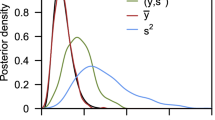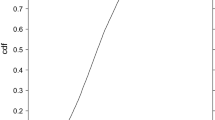Abstract
A survey is given of requirements an expert system must satisfy to be usable in disciplines other than pure statistics. Relevant data were gathered during a three year observation of consultations between researchers and medical statisticians. It had been anticipated that a knowledge base of limited size could be established and a set of largely deterministic rules could be identified which would enable the knowledge to be harnessed as an informative and utilitarian backward chaining expert system.
Similar content being viewed by others
Explore related subjects
Discover the latest articles, news and stories from top researchers in related subjects.References
S.M. Gore, I.G., Jones and E.C. Rytter, Misuse of statistical methods: critical assessment of articles in BMJ from January to March 1976, Brit. Med. J. 1 (1977) 85.
D.G. Altman, Statistics in medical journals, Statist. in Med. 1 (1982) 59.
D.J. Hand, Statistical expert systems: Design, The Statistician 33 (1984) 351–369.
D.J. Hand, Expert systems in statistics, Knowledge Eng. Rev. 1 (1986) 2–10.
L. Cohen and M. Holliday,Statistics for Social Scientists (Harper and Row, 1982).
S. Siegel,Non-Parametric Statistics for the Behavioural Sciences (McGraw-Hill, 1956).
R. Davis and J. King, An overview of production systems, in:Machine Intelligence, vol. 8 (Ellis Horwood, Chichester, 1977).
S.J. Pocock,Clinical Trials: a Practical Approach (Wiley, 1983).
D.G. Altman and S.M. Gore,Statistics in Practice (The Devonshire Press, 1982).
J. Conklin, Hypertext: An introduction and survey, IEEE Trans. Computer (Sept. 1987) 17–14.
Author information
Authors and Affiliations
Rights and permissions
About this article
Cite this article
Clayden, A.D., Croft, M.R. Statistical consultation — Who's the expert?. Ann Math Artif Intell 2, 65–75 (1990). https://doi.org/10.1007/BF01530997
Issue Date:
DOI: https://doi.org/10.1007/BF01530997




